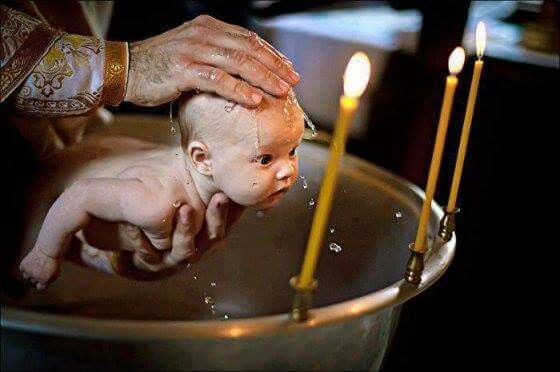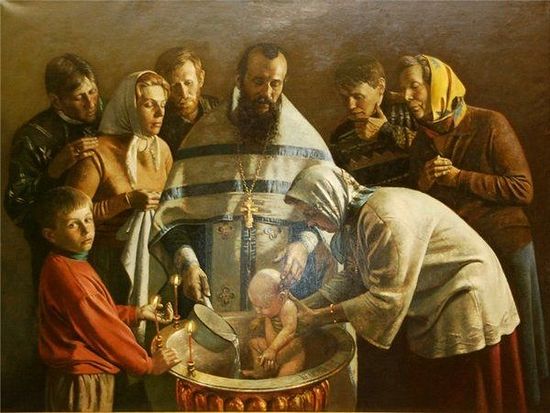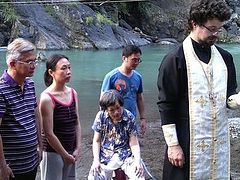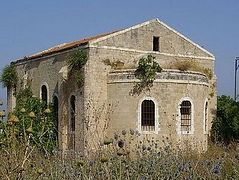Source: Preachers Institute
Yes, infant baptism is Biblical. While there is no description of an individual infant being baptized, the Bible describes five separate household baptisms:
- The Household of Cornelius, Acts 11:13–14: Send men to Joppa, and call for Simon whose surname is Peter, who will tell you words by which you and all your household will be saved.
- The Household of Lydia, Acts 16:15: And when she and her household were baptized, she begged us, saying, ‘If you have judged me to be faithful to the Lord, come to my house and stay.’ So she persuaded us.
- The Philippian Jailor’s Household, Acts 16:33: And he took them the same hour of the night and washed their stripes. And immediately he and all his family were baptized.
- The Household of Crispus, Acts 18:8: Then Crispus, the ruler of the synagogue, believed on the Lord with all his household. And many of the Corinthians, hearing, believed and were baptized.
- The Household of Stephanas, 1 Corinthians 1:16: Yes, I also baptized the household of Stephanas.
Some have argued that while the Bible may say ‘household’ or ‘family’ this does not have to include children. Maybe those households did not include children. While this may be the case, it is hard to imagine that at least one of these households did not include children. And given the fact that we have five explicit references to a whole household being baptized, we have to assume that many, many more such households were baptized. Surely some of them included children.
The word ‘household’ for any Israelite of the day included everybody in the household, children included. We must remember that a household always included children throughout the Scriptures. Every time God established or spoke about His covenant with the House of Israel, it included the whole of Israel: men, women, and children. Noah’s whole ‘household’ was taken into the ark with him (Genesis 7:1); Abraham had his whole household circumcised (Genesis 17:23), and specifically his son Isaac when he was eight days old (Genesis 21:4); the whole household of every family was taken out of Egypt, and God’s institution of the Passover specifically included the children (Exodus 12:24–28). If the Apostles had taught that children were to be excluded from full inclusion in the covenant, such an innovation would not have fit the prophetic covenants which preceded the fulfilled covenant enacted through Christ.
The pattern of the Old Testament covenants formed the framework for the apostolic understanding of the true covenant of Christ, and those covenants included children. They were covenants which were made with a nation, in which every household participated. This is what is expressed in the household baptisms of the New Testament. Even when an individual was baptized, this baptism placed him in a larger body. Individual adult baptisms occurred, but there were no individual covenants.
The Bible teaches us that under the Old Covenant, every male child was circumcised on the eighth day after birth. With his circumcision, the child became a full and complete member of the covenant and could eat of the Passover sacrifice. Baptism in Christ absorbed and fulfilled this rite, as it absorbed all initiation and cleansing rites of the day. Circumcision, we know from the first council in Jerusalem (Acts 15:5; Acts 21:21), was no longer necessary for the Gentile convert or his children. Nowhere in the Bible is it hinted that while absorbing the rite of circumcision, baptism would suddenly and without precedent exclude children. Jesus did not have a problem with children gaining full inclusion to the covenant: He Himself was circumcised as an infant (Luke 2:21), like John the Forerunner (Luke 1:59).
Here we need to introduce a statement by Jesus Himself on the subject of children and faith. In Luke 18, some children are brought to Him to receive a blessing. His disciples try to interfere. But Jesus immediately rebukes them, saying,
Let the little children come to Me, and do not forbid them; for of such is the kingdom of God (Luke 18:16).
A sentimental reading of this passage tells us that Jesus loves children, and that we should not stop them from trying to ask questions about Him or wanting to pray to Him, or tell them that they are too young to get to know Him. While this is true, no one the Lord is talking to thought differently. These were people, we have to remember, who circumcised their children, included them in the Passover rituals and taught them from a young age about God, Israel and the Prophetic writings. The Jews were fanatical, by our modern standards, in their desire to raise their children in the faith. This is not a Hallmark moment in the Gospels.
Jesus is in fact including children in His Kingdom. And His inclusion of children in the Kingdom includes them in the covenant He establishes in His Name. There is no partial involvement in the Kingdom of Heaven, just as there is no partial inclusion in the covenant. We are either members or not. Jesus is saying that children are in, and there is to be no argument about it. There is absolutely no room here to make an argument that children must wait until some magical age before they too can be included with full rights into the Church and at the altar table.
Jesus was once an infant Himself. And Jesus was never separate from God, even in His mother’s womb. The heretical Nestorians claimed that Jesus’ divinity only descended upon Him at baptism. But the Orthodox Church has always declared that He united God and man from the moment of His conception, and the Orthodox believe that His Kingdom belongs to children. Not only because the covenant is with the whole household; not only because a distinction of age was never introduced into the practice of baptism; not only because such a distinction would not have matched the Old Testament covenants which served as the prophetic model for the New Covenant; but because Christ Himself became incarnate as an infant child. In Him all ages, like all humanity, are sewn into the perfect union expressed in the eucharistic supper of the New Israel, which we join only through baptism. Christ makes both childhood and adulthood fully capable of expressing and participating in the Kingdom of Heaven.






